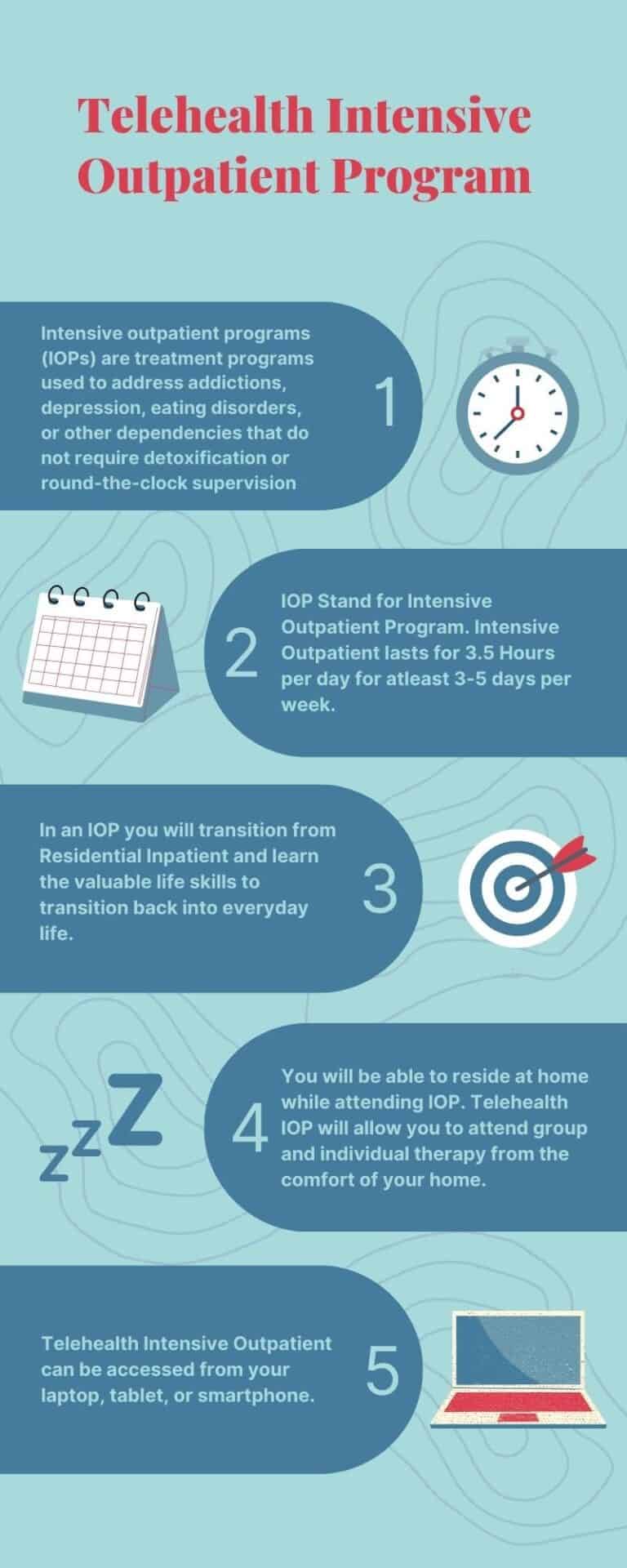Navigating the Complexities of Twin Medical Diagnosis Treatment Within an Intensive Outpatient Program Establishing
In the world of mental health and dependency treatment, the intersection of twin diagnosis presents a nuanced obstacle that requires an extensive and customized technique. Within the confines of an Extensive Outpatient Program (IOP) setup, the complexities of resolving co-occurring mental health problems and compound make use of conditions require a fragile balance of know-how and resources to browse. The assimilation of evidence-based methods, collaborative efforts amongst multidisciplinary teams, and a keen understanding of the distinct demands of each individual are important parts in efficiently managing double medical diagnosis within an IOP framework. By discovering the ins and outs of twin diagnosis therapy within this intensive outpatient context, a more clear course emerges in the direction of holistic and lasting recuperation for those coming to grips with these linked challenges.
Dual Diagnosis Introduction
What is the value of recognizing twin medical diagnosis in psychological health and wellness therapy? It is vital to acknowledge and resolve this comorbidity as it can substantially affect the efficiency of mental health therapy.
Comprehending dual medical diagnosis is necessary as it requires a comprehensive and incorporated method to therapy. By recognizing the interplay in between substance usage and mental health, medical care suppliers can tailor treatments to satisfy the unique requirements of each individual. This all natural method not just addresses signs yet likewise targets hidden elements that add to the dual medical diagnosis.
Moreover, without treatment dual diagnosis can lead to a cycle of regression and worsening psychological health signs. By recognizing the complexity of twin diagnosis and supplying specialized care, medical care professionals can support people in achieving long-lasting recuperation and improved mental wellness.
Tailored Therapy Plans
Acknowledging the complex interplay in between material use disorders and psychological wellness problems, the development of tailored therapy strategies is extremely important in dealing with the intricacies of twin medical diagnosis in mental health treatment. Tailored treatment strategies are individualized strategies that consider the distinct requirements, obstacles, and objectives of people encountering twin diagnosis. These plans are designed collaboratively by a multidisciplinary team of professionals, including psychiatrists, psychologists, social workers, and addiction experts, to make sure detailed and incorporated treatment.
Tailored therapy plans normally entail a mix of treatments, medicines, and behavioral interventions that target both the compound use disorder and the mental health problem simultaneously. These strategies might consist of cognitive-behavioral therapy, dialectical behavior modification, medication-assisted therapy, specific therapy, group therapy, and family treatment, amongst various other evidence-based interventions. By customizing therapy strategies to specific scenarios, tailored plans can resolve the source of dual diagnosis, advertise long-lasting recovery, and improve total high quality of life for individuals struggling with co-occurring problems.
Integrated Treatment Method
By including social treatments like family therapy, trade support, and neighborhood resources, the treatment ends up being much more alternative and tailored to the individual's particular requirements. Generally, an incorporated care method in double diagnosis treatment within an intensive outpatient program setting intends to give thorough, reliable, and individualized treatment to individuals encountering co-occurring disorders (Intensive Outpatient Program (IOP)).
Challenges in IOP Setting
In the context of twin medical diagnosis therapy within an extensive outpatient program, navigating the complexities of co-occurring material usage conditions and mental health conditions offers substantial difficulties. One of the primary difficulties in the IOP setup is the sychronisation of care in between psychological health professionals and material misuse specialists to ensure a thorough therapy method. This requires reliable communication, collaboration, and a deep understanding of just how these conditions interact and affect each other.
Furthermore, the ever-changing nature of compound use problems and mental wellness conditions includes one more layer of complexity - Intensive Outpatient Program (IOP). Customers in an IOP may experience unexpected shifts in their signs and symptoms or substance desires, needing punctual intervention and modification of treatment strategies. Balancing the strength of therapy and support while permitting clients the adaptability to handle their everyday duties find this can be a look at this now fragile equilibrium to keep
Furthermore, addressing stigma and resistance to treatment within the IOP setting can restrain development. Some people may be hesitant to divulge their dual medical diagnosis or might feel ashamed, preventing their engagement in the restorative procedure. Overcoming these barriers demands a supportive and non-judgmental atmosphere that cultivates trust and openness.

Collaborative Expert Initiatives

Collaborative efforts likewise prolong to normal interaction and information sharing among team members to make sure a natural therapy approach. Ultimately, an unified front of experts functioning with each other boosts the performance of twin medical diagnosis treatment within an intensive outpatient program.
Conclusion
To conclude, efficient double diagnosis therapy within an extensive outpatient program setup needs customized therapy strategies and an incorporated treatment technique. Obstacles might develop in this setup, yet joint initiatives amongst specialists can aid browse these complexities. By attending to the special requirements of individuals with co-occurring mental health and substance use problems, IOP programs can give thorough and all natural like sustain healing and overall well-being.